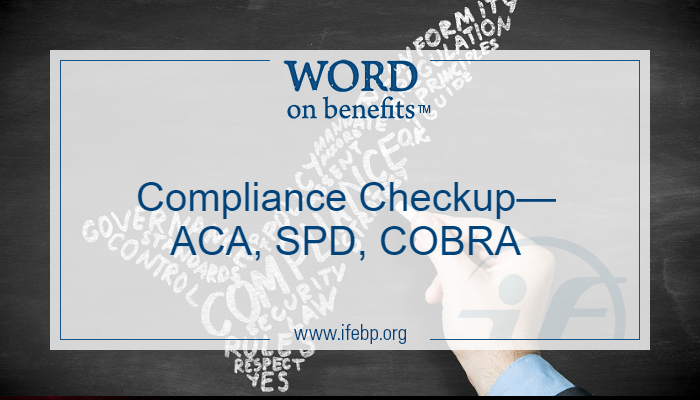
The future of the Affordable Care Act (ACA) remains uncertain, but employee benefit plan sponsors should be alert for compliance issues that aren’t going away.
Scott Segal addressed common compliance errors during his presentation “Employee Benefits Compliance ‘Hot Topics’” during the 26th Annual Health Benefits Conference & Expo (HBCE) in January. Segal is Employee Retirement Income Security Act (ERISA) and employee benefits counsel at USI Benefit Services in Fort Lauderdale, Florida.

Segal addressed the uncertainty surrounding ACA compliance. Despite President Donald Trump’s executive order directing his administration to repeal the law, “it’s business as usual” for now, he said.
“What does that mean? 1095 reporting is going to be required unless the sky falls tomorrow, and it may,” he joked. “At least right now, 1095-Cs are required.”
Segal’s presentation also outlined non-ACA compliance issues he sees when conducting reviews for his clients.
Visit the Future of ACA for the latest on repeal and replace efforts. Learn what it takes to change the law, what’s happened so far, and provisions for plan sponsors.
Plan Documents and Wrap Plans
 When employers receive a request for their plan document, most supply the booklet (also called the certificate) they receive from their insurance provider. “Guess what? That is not compliant with the ERISA requirements for plan documents by themselves. There is some missing information that needs to go along with those certificates in order to make them a compliant document,” he said.
When employers receive a request for their plan document, most supply the booklet (also called the certificate) they receive from their insurance provider. “Guess what? That is not compliant with the ERISA requirements for plan documents by themselves. There is some missing information that needs to go along with those certificates in order to make them a compliant document,” he said.
Under ERISA, almost every single one of an employer’s benefit plans, including group term life, dental, health and disability insurance, requires its own plan document and summary plan description (SPD)—unless the plans are wrapped together into one booklet called a wrap plan.
The wrap plan can include all of the missing information from the certificates, such as company-specific details, and will be compliant with ERISA. Employers should look at their wrap plans at least once a year for issues such as eligibility or changes in benefits to make sure the plan is up to date.
Employers that do not have a wrap plan technically must file a Form 5500 with the Department of Labor (DOL) for each of their separate plans that have at least 100 people enrolled on the first day of the plan year. The fine for noncompliance is $2,067 per day, although DOL has a delinquent filer program that costs $4,000 per plan and allows employers to correct all past Form 5500 mistakes.
Delivery of SPDs
ERISA requires delivery of a plan document only after receiving a request, and plan sponsors have 30 days to comply. SPDs, however, must be delivered to participants within 90 days of enrolling in the plan, and the penalty for noncompliance is $100 per day per person. SPDs also must be delivered at a minimum of once every five years after first enrollment.
What qualifies as delivery? The Internal Revenue Service (IRS) and DOL have different rules, but posting the SPD on the company intranet alone is not considered sufficient delivery by either agency.
However, posting the SPD on the company intranet and sending a link or a pdf to your employees with work e-mail accounts is sufficient, he said.
Employers can ask employees without work e-mail accounts to sign a form saying they agree to receive the SPD in their personal e-mail account, or employers can mail the employees a paper copy. For lengthy plan documents, sending a paper copy of the wrap plan itself with instructions on how to receive the certificates may be compliant.
Even governmental groups and church groups not subject to ERISA usually must follow state laws that require them to deliver SPDs in some manner. “You’re still better off following the rules as guidelines, as opposed to not doing anything,” Segal suggested.
COBRA
The biggest issues in compliance with the Consolidated Omnibus Budget Reconciliation Act (COBRA) relate to notices and which plans are covered, Segal explained.
“Believe it not, employee assistance programs (EAPs) could be subject to COBRA,” he said. IRS has said that EAPs could be subject to COBRA “if it is more than just a referral service, if there are counseling sessions,” he said.
This is a risk for plans because EAPs are offered to all employees and are increasingly being “thrown in” by plan providers.
[Related: COBRA Online Learning Course]
On the issue of COBRA notices, Segal said, “it’s important to know that there are two COBRA notices—the initial notice and then the election notice.”
Many plans use vendors to mail COBRA election notices to employees who have been terminated, but there also is an initial notice employees should receive 60 days after enrolling in a plan. Outside vendors may not know who is being hired, and initial notices might not be going out, he said. The penalty for not providing initial notices can be $100 per day per participant.
We may be experiencing a time of uncertainty, but there’s one thing you can count on—When it comes to compliance, uncertainty is no excuse for failing to comply! Count on the International Foundation to keep you informed on the latest regulatory developments impacting employee benefits. Check the Future of ACA page for updates and watch Today’s Headlines to be the first to know new regulations and compliance requirements.
![]()
Kathy Bergstrom, CEBS
Editor, Publications at the International Foundation





